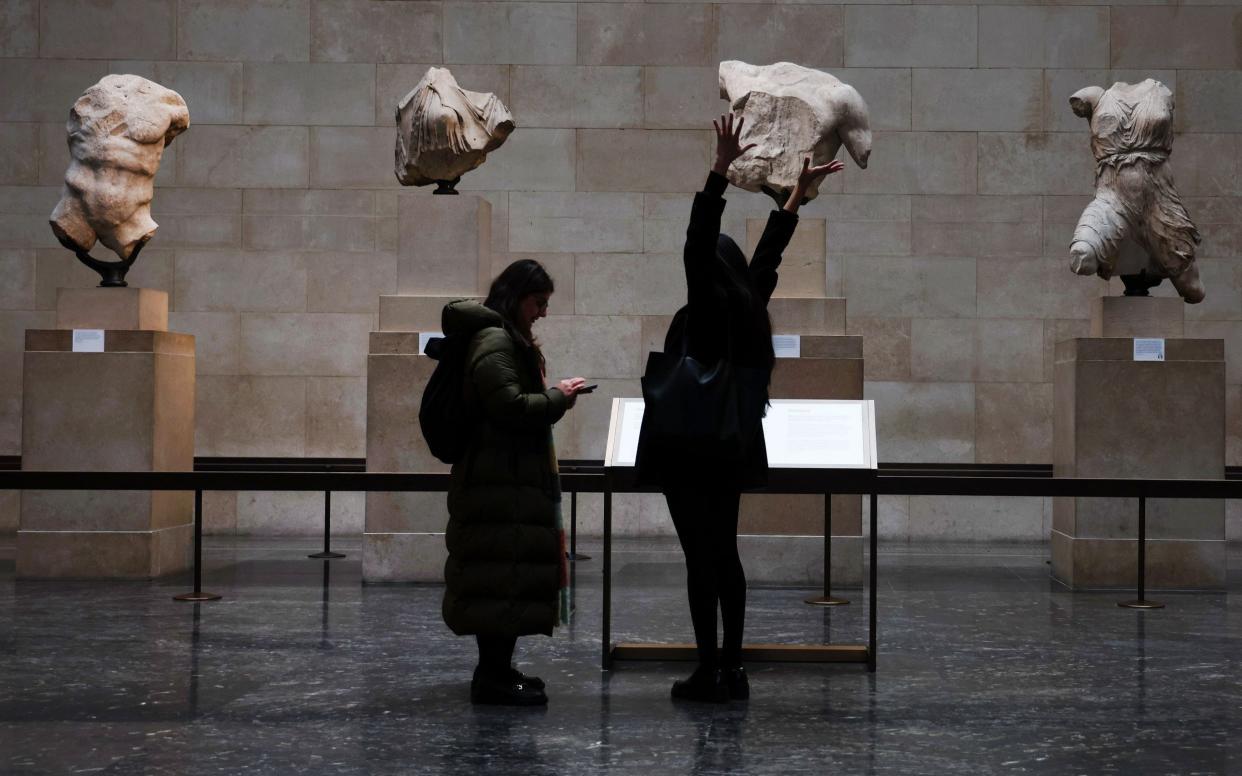Letters: The Elgin Marbles dispute reveals the incompetence of the PM’s team

- Oops!Something went wrong.Please try again later.
SIR – As the head of the Scheherazade Foundation, a British NGO that has been working to return treasures from the British Museum to their rightful owners, I am utterly flummoxed by the apparent diplomatic incompetence of Rishi Sunak’s team (“Sunak cancels on Greek leader over row about future of Elgin Marbles”, report, November 28).
If there was an award for burying one’s head in the sand, the current occupants of No 10 would surely take it cum laude.
Tahir Shah
London SW1
SIR – The future of the Elgin Marbles is not a regular topic of conversation in the Fox and Hounds in Acton Turville. The future of the Prime Minister is.
Of course the sculptures must go to the excellent Acropolis Museum in Athens. How should we feel were the stained glass from Canterbury Cathedral stuck in a gallery in Greece?
Matthew Butler
Acton Turville, Gloucestershire
SIR – History and technology have moved on since the Parthenon sculptures were removed. Snubbing the Greek minister does nothing to resolve this matter.
I recall reading some years ago that the sculptures had been 3D-mapped and flawless reproductions could easily be made of them, allowing the originals to be returned to Greece. While this technology may not be suitable for other artefacts, it would resolve this dispute. Visitors to the British Museum could still enjoy the beauty and story of the sculptures, and an explanation of how the copies were created would satisfy curious minds.
Stephen Howey
Woodford Green, Essex
SIR – Recently I was privileged to attend an open day at an engineering firm, where it displayed a full-size diesel engine created by a 3D printer. The technology exists. Let’s use it.
Gerry Simpson
Chester
SIR – On my first trip to Athens in the early 1960s as part of a normal Royal Navy Mediterranean Fleet visit programme, I went ashore especially to see the Parthenon.
It had only three or four visitors that afternoon, one of whom was sitting down on a part of the remains. He spoke to me in English and I learnt that he was the Greek government’s adviser on the ruins. At that time the local air quality in Athens was a national concern and his pleas for funds to preserve the remains from air pollution were falling on deaf ears. The remaining buildings were deteriorating rapidly. He was pleased that Britain had taken the Elgin Marbles out of harm’s way and also wished we had more of the statues in safe custody in the British Museum.
Given the standard of modern reproductions, Greece should not have the original Elgin Marbles even on loan.
Brian Elphick
Storrington, West Sussex
Gender ideology
SIR – So far this week, the Telegraph has reported (November 27) that 100 children in a year have been given high-risk puberty blockers, despite the Government telling us that this would only happen in clinical trials; Celia Walden (Features, November 28) has written about an NHS hospital recording newborn babies’ gender identity rather than noting the essential sex characteristic; and the paper has also led on the story that the equalities regulator the EHRC is facing a “special review” of its international accreditation after lobbying by the controversial LGBT charity Stonewall.
What these three stories tell us is that Stonewall’s malign influence continues across public bodies. Time and again we have heard Conservative ministers talk about various aspects of gender ideology that are to be reined in, but we have seen no effective action.
The UK taxpayer continues to fund Stonewall and allied groups to promote an ideology that, when understood, is shared by relatively few people. If the Government isn’t prepared to halt this, will it then explain to us why it is doing it and who benefits?
Tim Barnsley
Berwick-upon-Tweed, Northumberland
SIR – The right to live according to your conscience within the bounds of the law is a fundamental tenet of a democratic society and should be defended. However, with that right goes the responsibility to respect those who hold a different opinion.
It is my belief that nothing can alter chromosomal identity, and my right to hold that opinion should be protected by law. Spreading the ideological dogma of interest groups is not the business of the Government or the UN.
Annie Fellows
Marlborough, Wiltshire
Telegraph’s role
SIR – As Lord Johnson (report, November 28), the investment minister, regards opposition to the sale of the Telegraph to a foreign state as “sentimental” because he thinks traditional news sources hold little sway today, perhaps he would say the same about our other longstanding institutions, such as the monarchy, the House of Commons and the Lords.
Where would Lord Johnson prefer us to get our news? TikTok?
Alexander Stilwell
Godalming, Surrey
In need of a DAB hand
SIR – The change to DAB+ (Letters, November 28) will ultimately make most car radios redundant. As they are often integral to dashboards to prevent them being stolen, how is one to change the set?
Gavin R Tait
East Kilbride, Lanarkshire
Bringing home bacon
SIR – In her feature on food health (November 28), Sam Rice comments on the full English breakfast.
What she omits is that bacon is legally defined by the US Department of Agriculture so that only “streaky” bacon from the animal’s belly can be called such. Thus, because most dietary information emerges from that part of the world, the term bacon is synonymous with fat running all over the frying pan.
The solution is to buy good-quality back bacon from your local family butcher. The same goes for reduced-fat sausages, which should ideally be made on the premises. Those who cannot source their breakfast in this way should consider moving.
Chris Benn
Swayfield, Lincolnshire
Action on immigration
SIR – With Rishi Sunak as Prime Minister and James Cleverly as Home Secretary, traditional Conservatives (and many others) will have no motivation to vote for the party at the next election.
Mr Cleverly seems to have no appetite for robust action on immigration and stopping the boats (“Conservatives face growing divide on immigration”, report, November 28). Similarly, Mr Sunak appears to believe that he need only mouth a few semi-Conservative platitudes to keep things afloat.
Voters are no fools. By their inaction, Mr Sunak and Mr Cleverly are effectively signing their party’s death warrant.
Nicholas Dobson
Doncaster, South Yorkshire
Letter lottery
SIR – I read your correspondents’ views on Royal Mail with interest (Letters, November 27).
I am mute, so the nicest way to keep in touch with my sister is by letter. Unfortunately, the postman only delivers to her address twice a week at best, so I begrudge buying first-class stamps – but still do. Our own postman is consistent and her letters arrive the next day. Another postcode lottery.
Letter-writing is dying out not just because of new technology, but also because of failures in the postal service.
Rob Williamson
Lockerbie, Dumfriesshire
SIR – Karen Mullan’s card took a year to arrive (Letters, November 27). I can do better.
Royal Mail recently delivered four postcards that were posted in Margate in 1905 and 1906. Two were addressed to my house but the other two were addressed to the same person at another house in the village that no longer exists. Full marks to Royal Mail for sorting, but not for delivery.
Chris Ainsworth
Stetchworth, Suffolk
Coo de grâce
SIR – When I left school many years ago, I was concerned about the lack of academic achievements on my CV (Letters, November 28), so concentrated on “other achievements”. For several years it listed, among other dubious successes, “first in under-18 pigeon-plucking competition (aged 13) at game fair”.
A recruitment agent eventually suggested I remove it.
Jo Marchington
Ashtead, Surrey
A great British breed at the mercy of fashion

SIR – Your lovely but sad article (November 24) on the demise of many native British dog breeds did not mention the wonderful Dandie Dinmont, the oldest breed of terrier.
When I bought one of my last Dandies, there were only 61 born that year, compared with 47,000 Labradors. I wonder how many labradoodles and cockapoos were born this year. People say the appeal is that they are hypoallergenic and don’t moult. Dandies are at least pure-bred, but sadly not in fashion.
Jane Drysdale
Edinburgh
Why pothole repairs are kicked down the road
SIR – Replacing local pothole repairs with wholesale road resurfacing (Letters, November 28) is attractive as a long-term strategy, but such a proposal fails to consider the increase in costs involved.
It would result in many areas being left untreated for even longer. Total funding is limited, and unlikely to rise to anything even close to the sum needed to bring our large road network up to the desired standard. Local authorities have always had to prioritise funding for road maintenance against competing demands from services such as education and elderly care. In hard times, road maintenance has been among the first services to be cut.
This is not to defend the poor standard of pothole repairs described in recent letters. However, if done well, these can provide an effective and lasting solution.
Bob Hart
Newark, Nottinghamshire
SIR – Here in Tavistock last year, after several years of pleading with the local council, our road was finally given a makeover, removing the deep potholes that had made it almost undriveable.
In April this year, however, the road was dug up for a new gas main. That work was finished in June, and the road was reinstated. But now it’s being dug up again so that the main can be connected to each house. It’s like living on a building site.
Stephen Woodbridge-Smith
Tavistock, Devon
SIR – Harry Barker’s interpretation of the AA’s pothole puddle avoidance advice (Letters, November 28) is based on a short summary of our policy. Of course, safety is paramount, and we made clear that drivers should only avoid potholed puddles if it is entirely safe to do so. Otherwise, less damage is inflicted by slowing right down. This also avoids splashing pedestrians.
Hopefully the extra £8.3 billion in maintenance funding from the Government will begin to make roads safer for those on two wheels and four, without the need to avoid puddles.
Edmund King
President, AA
Basingstoke, Hampshire
Letters to the Editor
We accept letters by email and post. Please include name, address, work and home telephone numbers.
ADDRESS: 111 Buckingham Palace Road, London, SW1W 0DT
EMAIL: dtletters@telegraph.co.uk
FOLLOW: Telegraph Letters on Twitter @LettersDesk
NEWSLETTER: sign up to receive Letters to the Editor here

